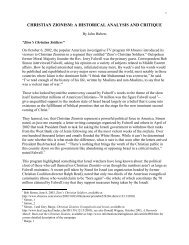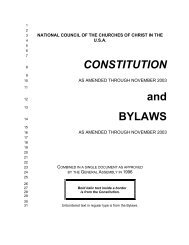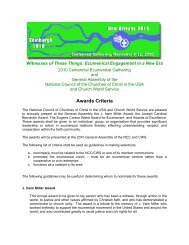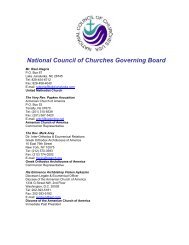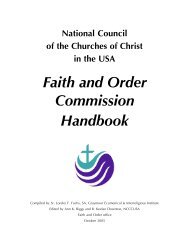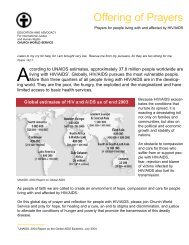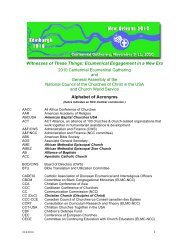Common Agreement on Mutual Recognition of Baptism - National ...
Common Agreement on Mutual Recognition of Baptism - National ...
Common Agreement on Mutual Recognition of Baptism - National ...
Create successful ePaper yourself
Turn your PDF publications into a flip-book with our unique Google optimized e-Paper software.
858<br />
859<br />
860<br />
861<br />
862<br />
863<br />
864<br />
865<br />
866<br />
867<br />
868<br />
869<br />
870<br />
871<br />
872<br />
873<br />
874<br />
875<br />
876<br />
877<br />
878<br />
879<br />
880<br />
881<br />
882<br />
883<br />
884<br />
885<br />
886<br />
887<br />
888<br />
889<br />
890<br />
891<br />
892<br />
893<br />
894<br />
895<br />
896<br />
897<br />
898<br />
899<br />
900<br />
901<br />
902<br />
They emphasized that the Word <strong>of</strong> God engrafts believers into the body <strong>of</strong><br />
Christ. Thus baptism was understood as a visible form <strong>of</strong> that Word, c<strong>on</strong>veying<br />
and communicating the grace <strong>of</strong> God <strong>on</strong>ly as it is administered in c<strong>on</strong>juncti<strong>on</strong><br />
with the proclamati<strong>on</strong> <strong>of</strong> the Word. ii There could be no baptism unless there<br />
was also proclamati<strong>on</strong> <strong>of</strong> the Word. Also, because <strong>of</strong> their emphasis <strong>on</strong> the<br />
power <strong>of</strong> the Word <strong>of</strong> God, reformers emphasized the need to administer the<br />
sacrament <strong>of</strong> baptism, as all <strong>of</strong> the rites <strong>of</strong> the church, in the vernacular. That<br />
which was not understood could not be properly received and thus could not be<br />
efficacious.<br />
They focused attenti<strong>on</strong> <strong>on</strong> the water as the primary and <strong>on</strong>ly essential symbolic<br />
element. Thus they eliminated elements <strong>of</strong> the rite that were deemed n<strong>on</strong>essential<br />
and n<strong>on</strong>-scriptural: elements such as oil, salt, spittle, and candles.<br />
Related to this was their c<strong>on</strong>cern to clarify that baptism itself is a sign and<br />
promise <strong>of</strong> the baptism <strong>of</strong> the Holy Spirit. iii<br />
They focused attenti<strong>on</strong> <strong>on</strong> the ecclesial dimensi<strong>on</strong> <strong>of</strong> the sacrament. Thus they<br />
emphasized the importance <strong>of</strong> baptizing in the c<strong>on</strong>text <strong>of</strong> the gathered<br />
community, and str<strong>on</strong>gly resisted the practice <strong>of</strong> private baptism. iv Because<br />
Reformed Protestants denied that baptism was necessary for salvati<strong>on</strong>,<br />
―emergency baptisms‖ were eliminated, and <strong>on</strong>ly ordained ministers were<br />
permitted to administer baptism, within the body <strong>of</strong> the church.<br />
They focused attenti<strong>on</strong> <strong>on</strong> the c<strong>on</strong>necti<strong>on</strong> between baptism and nurture in<br />
Christian faith. As a result <strong>of</strong> this, many reformers were c<strong>on</strong>cerned to choose<br />
appropriate godparents for infants to be baptized, and charging them with<br />
helping to raise the baptized child in the faith, though at other times the parents<br />
themselves were adm<strong>on</strong>ished to raise the child in the faith. Some Reformed<br />
rites also include adm<strong>on</strong>iti<strong>on</strong>s to the c<strong>on</strong>gregati<strong>on</strong> to assist in Christian nurture.<br />
The implicati<strong>on</strong>s <strong>of</strong> these revisi<strong>on</strong>s to baptismal practice were tw<strong>of</strong>old: <strong>on</strong> the <strong>on</strong>e hand, baptism<br />
was no l<strong>on</strong>ger understood to be necessary for salvati<strong>on</strong> or engrafting into Christ, but <strong>on</strong> the other<br />
hand, reformers in various ways sought to highlight water baptism as a real means <strong>of</strong> grace that<br />
c<strong>on</strong>veyed what it signified: forgiveness <strong>of</strong> sins and regenerati<strong>on</strong>. These four emphases<br />
(centrality <strong>of</strong> the Word, focus <strong>on</strong> water, ecclesial nature <strong>of</strong> baptism, and c<strong>on</strong>necti<strong>on</strong> <strong>of</strong> baptism<br />
and <strong>on</strong>going nurture) have c<strong>on</strong>tinued to be central principles in Reformed baptismal practices<br />
until the present, though they have not always received equal attenti<strong>on</strong> or led to the same<br />
outcome.<br />
Though Martin Luther is not strictly speaking a part <strong>of</strong> the Reformed Protestant family,<br />
his reforms clearly influenced the liturgical developments in the Reformed traditi<strong>on</strong>. In his<br />
baptismal liturgies, we can see increasing focus <strong>on</strong> the water as the central element in baptism, as<br />
well as emphasis <strong>on</strong> the Word in c<strong>on</strong>necti<strong>on</strong> with the rite. His first vernacular reformed rite <strong>of</strong><br />
baptism retained much <strong>of</strong> the medieval baptismal rite <strong>of</strong> Magdeburg, which was widely used in<br />
his time, though in his ―epilogue‖ he made it clear that elements such as ―breathing under the<br />
eyes, signing with the cross, placing salt in the mouth, putting spittle and clay <strong>on</strong> the ears and<br />
nose‖ were not central to baptism (First Taufbűchlein, 1523). In his sec<strong>on</strong>d Taufbűchlein (1526),<br />
Luther trimmed many more elements <strong>of</strong> the medieval rite, focusing even more str<strong>on</strong>gly <strong>on</strong> the<br />
water. v His interest in the central symbol <strong>of</strong> water can also be seen in his ―Flood Prayer,‖ in<br />
which the flood and exodus are interpreted as types <strong>of</strong> baptism. This liturgical element became<br />
22



